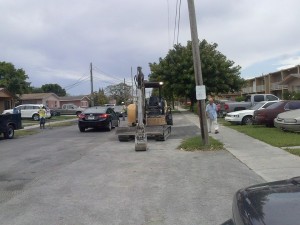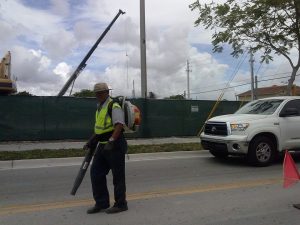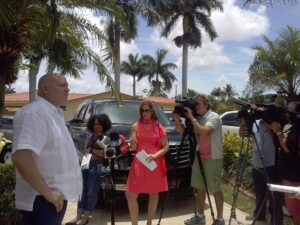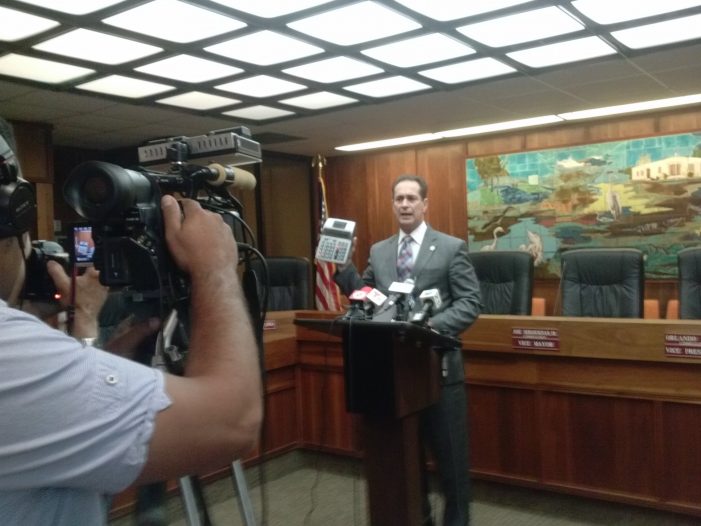(Continued from previous page)
While Diaz looks for the money and investigators look for answers, nothing will be paid without going through the mayor’s desk, he told Ladra. Deposits will be reported to him daily. But, wait… didn’t everything have to go through his desk before? Since August at least? The way it was explained to me, city checks need two signatures: One from the city clerk or deputy clerk and one from the mayor or, in his absence, the commission president or vice president.
Diaz told Ladra after the press conference that Chez — and whose departure led to the discovery of this accounting labyrinth — had kept him and everyone else in the dark. “That’s why we have department heads. I depend on the professional operation of these people,” Diaz said.
Yet, earlier that day he spoke with authority about how inefficient it was to have five banks. “How can you function with so much overhead? You can imagine the paperwork,” Diaz said.
He also talked about a computer glitch he discovered — but which emails indicate the administration knew about since January of last year — that reflects the city receives $30 million in ad valorem revenue, or property taxes. In reality, the city gets about $3.5 mil in property taxes.
“We need to get a grip on our finances. There is no way a municipality can conduct business with these discrepancies,” he said, distributing to reporters a printout of revenue estimates with up-to-year analysis that, indeed, showed $30 million budgeted in property tax revenue, which would be a $27 million shortfall.
 Problem with that is that the city has a $16 million annual budget, which is what the commissioners passed last fall. The printout the mayor’s people passed out was of a Fundware software program that three city employees told me hadn’t been used in more than a year since Sweetwater transitioned to another program. Could be obsolete. Diaz and Tirador both told me that the two programs were operating parallel to each other, which doesn’t really make sense. Talk about inefficient.
Problem with that is that the city has a $16 million annual budget, which is what the commissioners passed last fall. The printout the mayor’s people passed out was of a Fundware software program that three city employees told me hadn’t been used in more than a year since Sweetwater transitioned to another program. Could be obsolete. Diaz and Tirador both told me that the two programs were operating parallel to each other, which doesn’t really make sense. Talk about inefficient.
And Ladra saw no sign of a shut down on Wednesday afternoon. Maintenance workers clogged up traffic by parking a truck in the middle of 109th Avenue to use a leaf blower on the pavement. I saw no leaves. Other workers painted the frame on the west-facing window at City Hall, which looked perfectly fine to me. Others were digging up what was left of any piece of rare swale on Southwest 4th Street. I don’t know why. They should be preserving swale in Sweetwater.
 But all the seemingly aimless activity lends a little credence, at least, to the argument made by Commissioner Orlando Lopez — the mayor’s nemesis and challenger in next May’s election — that Diaz’s sky-is-falling press conference and rounds on the TV newstalk shows is nada más que a smokescreen about nada, dramatically played up by a “media whore” (his words, not mine) for political gain.
But all the seemingly aimless activity lends a little credence, at least, to the argument made by Commissioner Orlando Lopez — the mayor’s nemesis and challenger in next May’s election — that Diaz’s sky-is-falling press conference and rounds on the TV newstalk shows is nada más que a smokescreen about nada, dramatically played up by a “media whore” (his words, not mine) for political gain.
“He wants to be the city’s ‘savior,'” Lopez said. “He wants to come off as if he’s discovered all of this, when all he’s doing is showing he’s incompetent. The mayor is an inept baboon and is using the media to get false messages out.
“There is no financial crisis. The city has money,” Lopez said, adding that commissioners will consider a budget revision on Monday that includes more revenue then projected from both permits and licensing and red light camera tickets. Funny, the mayor didn’t distribute that at the press conference in which he said that the impact would be that “each resident will be sure that this is the kind of government transparency we bring to the city.”
Lopez claims that the breathless announcements made by the mayor are nothing short of grandstanding and political cover for the firing of the finance department and statements Diaz has made to the local political press corps.
The commissioner said he was all for a forensic audit, but said that the city should either use its auditor, Carlos Trueba, or write a request for proposals and open it up to a competitive process. Lopez said that Diaz had already talked to someone and had decided who to hire. “And she or he is going to find what the mayor wants them to find.”
Diaz admitted to Ladra that he had someone in mind that he wanted to appoint. The mayor basically said he didn’t trust the commissioners and that Trueba was already late a year and a half and had never noted anything wrong before, although there had obviously been issues for years, so why would he now?

Lopez also said that both he and Diaz, as commission president and vice president Maroño, had to sign signature cards for all the bank accounts, including new accounts that were opened recently at Chase. He doubted that the mayor did not know about the different bank statements, including the “clandestine accounts” used by Sweetwater Police, like other law enforcement agencies, for controlled narcotics buys and snitch payments. In his home, where his living room has been transformed already into a makeshift campaign office, Lopez went over the accounts that he knew of.
Three old accounts at Wells Fargo that had been transferred recently to Chase but had to stay open temporarily. That’s six already. A credit line at Regions where they had to have a bank account also, makes eight. A money market account makes nine. One police training fund, built from the percentage of citations, and four police forfeiture funds — which everyone but the cops agree seems like too many — makes for 14. So Lopez had explained the ones the mayor found Wednesday morning.
But now there are 19. So far.
Who knows how many there will be by the time you read this Thursday morning? Two dozen?
Pages: 1 2

